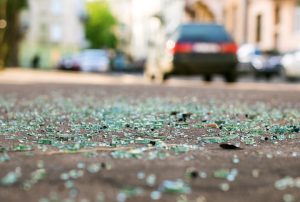
Seat belts can prevent vehicle ejections.
Woman Ejected, Critically Injured in Single-Vehicle Accident
According to a KSAT News report, a woman suffered critical injuries after a single-vehicle accident early this morning.
Police reported the accident happened at around 6 a.m. Wednesday, April 2nd, in the 10900 block of Loop 410 near Somerset Road. A 21-year-old woman was driving down Loop 410 in a Hyundai Equus when she overcorrected, swerving into a nearby lane and striking a guardrail. The impact sent the vehicle under the overpass and into a nearby ditch. The woman was ejected from her vehicle and suffered critical injuries but was coherent when taken to the hospital. No other vehicles were involved in the accident.
Did You Know?
Drivers are more likely to overcorrect when driving ill, fatigued, or after falling asleep at the wheel.
Overcorrection: A Common But Dangerous Mistake
An alarming number of serious and even fatal accidents are caused by simple mistakes like overcorrecting (also referred to as oversteering).
Overcorrection happens when a driver turns too much or very suddenly or overreacts to a road event (like an object in the road or a driver cutting you off). These accidents normally involve younger, less experienced drivers and can be extremely dangerous — the Insurance Information Institute estimates that overcorrection causes roughly 4% of all fatal accidents nationwide.
What Causes Overcorrection?
A 2018 study from the International Association of Traffic Safety Sciences (IATSS) sheds some light on what causes drivers to overcorrect.
When analyzing overcorrection accidents in North Carolina from 2011 to 2013, they found that:
- Oversteering decreased as driver age increased,
- Drivers were ∼2.2 times more likely to overcorrect when ill,
- Drivers were ∼3.4 times more likely to overcorrect when fatigued,
- Drivers were ∼1.4 times more likely to overcorrect when falling asleep,
- Driver characteristics and excessive speeding play a major role in overcorrection accidents.
In summary, those who are most likely to overcorrect when driving are younger drivers who are driving drowsy, falling asleep at the wheel, sick, or excessively speeding.
How to Avoid Overcorrecting
Learning what to do in unexpected situations can save you from an overcorrection accident.
Overcorrecting is an overreaction–an extreme response to a situation that doesn’t warrant one.
It can be really easy to panic when something unexpected and dangerous happens while driving. For example, animals running into the road in front of your car, wrong-way drivers heading straight for you, and unexpected objects falling into the road.
These things are all very dangerous and can cause younger drivers to panic. But if you panic and overcorrect, you’re far more likely to get seriously hurt and hurt other drivers around you. So, learn these safety tips in advance; they might just save your life:
- Don’t Drive Drowsy or Ill — If you can help it, don’t drive when you’re very sick or over-tired. If you catch yourself getting dangerously tired, take a 15-minute nap before continuing.
- Control Your Speed — Don’t exceed the speed limit, and follow the suggested speeds on curves and ramps.
- Wrong-Way Drivers — If a driver is coming at you the wrong way:
- Turn on your hazards
- Check your mirrors and then slowly and calmly pull off to the right (either exit or get into the shoulder and stop)
- Call 9-1-1 to report the driver
- Animal in the Road — If an animal suddenly appears in the road ahead of you:
- Turn on your hazards
- Slowly and firmly brake
- Honk loudly and steadily to alert other drivers and scare the animal off the road
- Remain in your car until the animal clears the road
- Object in the Road — If a large object suddenly appears in the road or falls off a truck in front of you:
- Apply the brakes
- Check your mirrors
- Turn steadily to avoid the object if possible and if the road is clear
- Straddle the object between your tires if it’s small enough and you can’t stop in time
- If you can’t avoid the object, gently pump the brakes before impact to remain in control of your car. Then, pull over and call 9-1-1 to report the accident.
Of course, you can do everything right and still be injured in a car accident. When that happens, Call Shaw!
Injured in a Car Accident That Wasn’t Your Fault? Call Shaw!
If you were injured in an accident that wasn’t your fault, you could be entitled to compensation for things like:
- Ambulance Costs,
- ER Treatment,
- Medical Bills,
- Pain and Suffering,
- Property Damage,
- Missed Work,
- and More.
We’ll help you find out if you have a case for free.
Call Shaw at 800-862-1260 or use the live chat to schedule a free case evaluation with an experienced car accident lawyer in San Antonio. There are no fees and no obligations attached, just the expert legal advice you need. Carabin Shaw has been a trusted name in San Antonio for over 32 years because we put our clients first. We look forward to serving you.
 Texas Accident & Injury News
Texas Accident & Injury News

